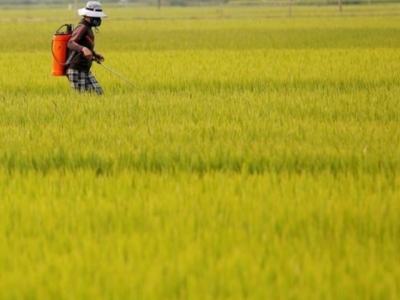Vietnam rice rates up for fifth week; currency moves weigh on India, Thailand

Demand is high and supplies are low as the Philippines might buy more rice for the rest of the year.
A farmer works on a rice paddy field in Quang Ngai province, Vietnam, March 14, 2018. Photo by Reuters/Kham
Rice export prices rose for a fifth straight week in Vietnam as demand remained robust and supplies thinned, but rates of Indian and Thai varieties dipped amid weakness in the local currencies of the top exporters.
Vietnam’s 5 percent broken rice prices rose to $445-$450 from $438-$440 previously.
“Demand is very high, while supplies are getting thin,” a Ho Chi Minh City-based trader said.
“The Philippines will meet exporters from Vietnam and Thailand on Friday to discuss a 250,000 ton deal, and it may buy more for the rest of the year.”
The Vietnamese government is also buying rice for stockpiling under its national reserve programme, the trader said, adding that Bangladesh could also buy rice from the country in June or July.
However, an official at Bangladesh’s food ministry said there was no plan to buy rice from Vietnam at the moment.
Private traders can buy if they find Vietnamese rice competitive, the official said, adding that he was not aware of any such ongoing talks.
Imports by Bangladesh, which emerged as a major buyer after 2017 floods damaged crops, could plunge 66 percent from a year ago to 1.2 million tons in 2018/19 as it is likely to harvest a bigger crop, industry officials said in early April.
In top exporter India, prices of the 5 percent broken parboiled variety fell by $8 to $409-$413 per ton, the lowest level in 4-1/2 months, on subdued demand and a depreciating rupee.
“The correction in rupee allowed exporters to reduce prices in the last few weeks. Now importers are waiting for further falls in prices,” said an exporter based at Kakinada in the southern state of Andhra Pradesh.
Indian rupee was trading near its lowest level in about 14 months.
Meanwhile, Thailand’s benchmark 5 percent broken rice rates also fell to $440–$445 per ton, free on board (FOB) Bangkok, from $445-$454 last week.
“Weakening of the baht is lowering rice prices,” a Bangkok-based trader said
The baht was down about 0.7 percent for the week. A weaker baht translates into lower export prices in U.S. dollars.
However, there continues to be fresh demand for Thai rice from Indonesia as well as speculation over possible deals with the Philippines, another trader said, adding that Thai exporters will have to deal with a supply crunch for at least another month, which should keep prices relatively high.
“Rice mills are reluctant to sell rice to keep the price high due to limited supply. But exporters will have to buy as they have to fulfil their shipment to Indonesia before the end of next month.”
Related news
 Clean production will help Vietnamese fruit compete with imports
Clean production will help Vietnamese fruit compete with imports Shifting to clean production is the right way for Vietnamese fruits to compete with the rising inflow of imports, both consumers and local fruit growers said
 Vietnam gearing up for upcoming lychee and longan harvests
Vietnam gearing up for upcoming lychee and longan harvests Bac Giang and Hai Duong provinces are projected to produce 150,000 tonnes and 55,000 tonnes of lychees respectively, while the longan yield of Hung Yen province
 Is $40 billion worth of farm exports beyond reach?
Is $40 billion worth of farm exports beyond reach? The high agricultural production growth rate in Q1 2018 has prompted government to set a target of exporting $40 billion worth of farm produce this year